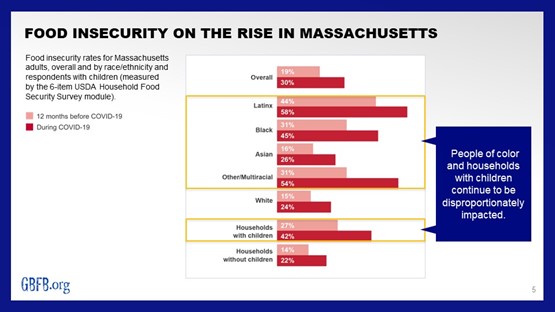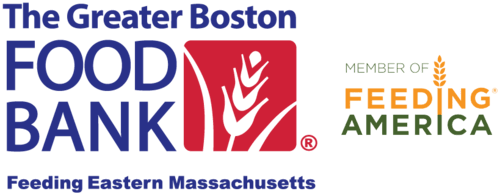New Food Insecurity in Massachusetts Report by
The Greater Boston Food Bank Finds Racial Inequities
in Food Insecurity and Gaps in Food Access
Contact:
Hilary Allard
hallard@thecastlegrp.com
781.244.7797
New Food Insecurity in Massachusetts Report by The Greater Boston Food Bank Finds Racial Inequities in Food Insecurity and Gaps in Food Access
Latinx and Black Residents Disproportionately Affected
BOSTON – May 5, 2021 – Massachusetts saw an overall increase in food insecurity of 55 percent from 2019 to 2020, according to a new survey conducted by The Greater Boston Food Bank (GBFB) in collaboration with the National Food Access and COVID Research Team (NFACT) and funded by the Hunger to Health Collaboratory (H2HC) and Stop & Shop, founding member of H2HC. Latinx and Black residents, who were impacted at higher rates by the COVID-19 pandemic and its economic effects, were also disproportionately impacted when it came to food insecurity, perpetuating disparities that existed before the pandemic. Among the barriers to food access revealed in the report, self-reliance and stigma were found to be some of the top reasons for gaps in food assistance utilization.
The study, “Gaps in Food Access During the COVID-19 Pandemic in Massachusetts,” was conducted by GBFB’s Business and Data Analytics team and led by GBFB epidemiologist, Dr. Rachel Zack. The researchers polled 3,000 residents online between October 2020 and January 2021 and estimated that 30 percent – or 1.6 million adults in the state – were experiencing food insecurity at the time of the survey. Among Massachusetts residents, 58 percent of Latinx adults, 45 percent of Black adults, 26 percent of Asian adults, 24 percent of White adults and 42 percent of adults with children reported experiencing food insecurity.
The statewide survey was conducted to identify the prevalence of food insecurity during COVID-19, as well as gaps and disparities in food assistance use, and to develop data-driven recommendations to increase food access. Low-income adults were oversampled to reach those most likely in need of food assistance and statistical methods were used to obtain estimates representative of the Massachusetts population.
“The COVID-19 pandemic created historic need and unprecedented challenges, at levels unseen during my 25 years leading The Greater Boston Food Bank,” said Catherine D’Amato, GBFB President and CEO. “The results of the study reflect what we already experienced – that the need jumped dramatically and continues to disproportionately impact people of color. While we, and our network of community partners, are inspired and energized by the progress we’ve made to combat the pandemic, the economic effects will linger indefinitely for those who are suffering from long-term unemployment. There is much more work to be done.”

Kay Barriers to Food Assistance Use, Self-Reliance and Stigma
While food pantries and the Supplemental Nutritional Access Program (SNAP) are critical resources, among Massachusetts adults facing food insecurity during the pandemic, only 1 in 3 reported using food pantries and 1 in 2 reported using SNAP. The majority of those who experienced food insecurity but didn’t utilize either resource chose not to because of their desire to support themselves. A desire for self-sufficiency was cited as the number one reason for not using food pantries (74 percent) and the number two reason for not participating in SNAP (73 percent).
Other widely cited reasons include embarrassment (58 percent of those who did not use food pantries; 46 percent of those who did not participate in SNAP) or a fear that others would find out (51 percent of those who did not use food pantries; 46 percent of those who did not participate in SNAP).
Those who did use food pantries felt positively about their experiences: 89 percent felt welcome, 80 percent felt the food available aligned with their cultural beliefs, and 75 percent thought the food was of good quality.
Other leading reasons for not using food pantries include not knowing when they are open (62 percent); concern about having too many personal assets (57 percent); inconvenient hours or locations (54 percent); and transportation issues (53 percent). Additionally, 31 percent cited concerns over perceived racial or ethnic discrimination as a reason for not using food pantries.
Barriers to SNAP participation include concerns about eligibility (78 percent) or about paperwork that needs to be shared (51 percent), and not knowing how to apply (42 percent).
Programmatic and Policy Recommendations
Given the need and feedback from respondents around stigma, barriers, eligibility and awareness, the report identified goals of decreasing stigma around seeking/utilizing food assistance and decreasing inequities in food insecurity and access for people of color.
Programmatic recommendations include:
- A public awareness campaign to reduce stigma and overcome barriers to access, engaging multiple sectors including healthcare, school systems and retailers
- Enhancing engagement with communities of color to ensure equitable distribution of food, mitigate concerns over potential discrimination, amplify diverse voices, and ensure access to multi-lingual materials and staff
- Providing an equity perspective on food distribution, access, distribution, data collection, recommendations, and investments
Federal and State policy recommendations include:
- Prioritizing and funding federal food and financial assistance policies and infrastructure investments to equitably reduce food insecurity and poverty; specifically, elevating funding and increasing access to The Emergency Food Assistance Program (TEFAP), SNAP and the Supplemental Nutrition Program for Women, Infants and Children (WIC).
- Reducing the administrative burden and access for those applying for benefits
- In Massachusetts, continuing to prioritize funding at increased levels for the Massachusetts Emergency Food Assistance Program (MEFAP), Healthy Incentives Program (HIP) and ongoing investment in the food assistance infrastructure
“The survey responses dispel stereotypes around those who need public assistance. It’s clear that people want to support themselves and view seeking food assistance, whether in the form of visiting food pantries or in signing up for SNAP, as an undesirable option,” said Dr. Lauren Fiechtner, MD, MPH, Director of Nutrition, MassGeneral Hospital for Children (MGHfC) and GBFB’s Senior Health and Research Advisor. “We want to ensure that people know the help is there for them and remove barriers and stigma so that everyone who needs help in obtaining nutritious food can access it.”
If people are in need of food, they are encouraged to visit GBFB.org/need food where they can find a list of resources and search for a food program by zip code.
About The Greater Boston Food Bank:
The Greater Boston Food Bank (GBFB) is the largest hunger-relief organization in New England and among the largest food banks in the country. In response to the economic impact of the COVID-19 pandemic, GBFB distributed the equivalent of nearly 82 million meals in 2020 through its network of 600 dedicated food distribution partners and programs in the 190 cities and towns across Eastern Massachusetts. A member of Feeding America, the nation’s food bank network, GBFB’s mission is to end hunger here and it is committed to providing at least three healthy meals a day to everyone in need. For more information, visit us at GBFB.org, follow us on Facebook, Twitter (@gr8bosfoodbank) and Instagram, or call us at 617.427.5200.
About the Hunger to Health Collaboratory
The Hunger to Health Collaboratory is a cross-sector leadership initiative dedicated to reducing the health consequences of hunger. Generously supported by Stop and Shop, the Hunger to Health Collaboratory works to advocate for health equity and food security, convene partners across sectors, and promote models and programs that increase health, wellbeing, and quality of life for all. H2HC’s members include Stop and Shop, The Greater Boston Food Bank, Babson College, Boston Medical Center, Children’s HealthWatch, C&S Wholesale Grocers, McKinsey and Company, and Rasky Partners. Learn more at www.hungertohealthcollaboratory.org
